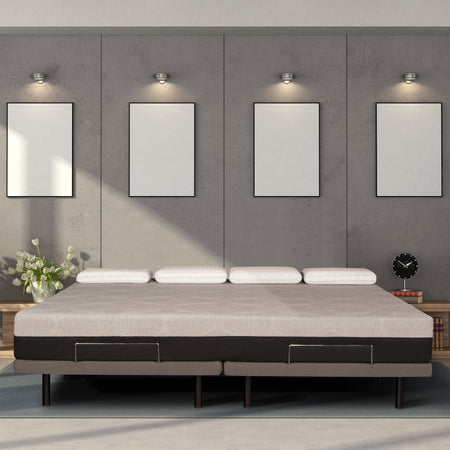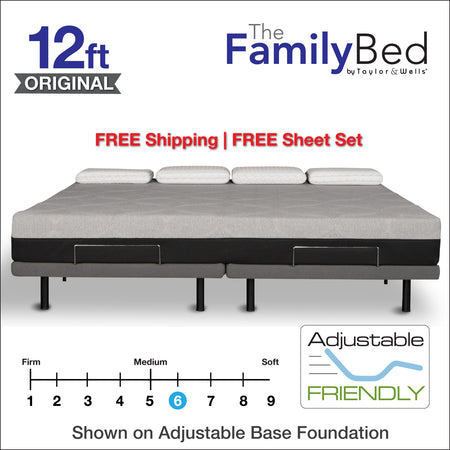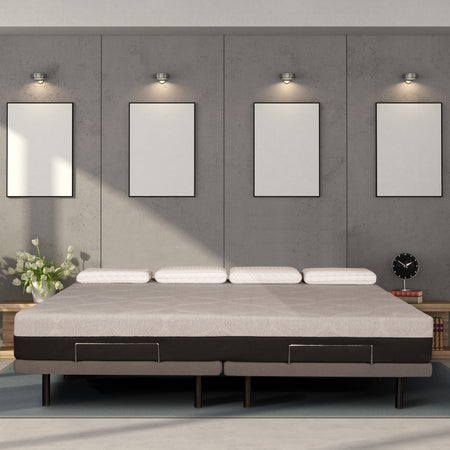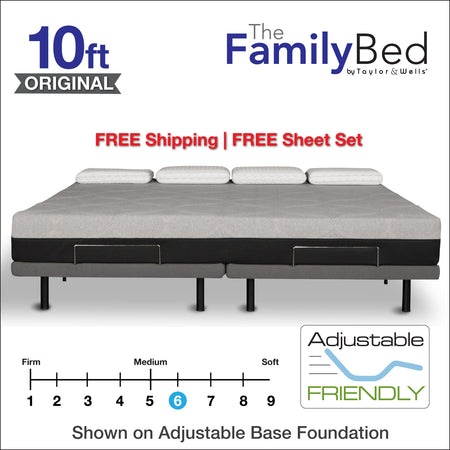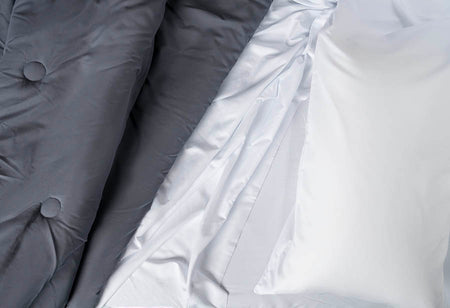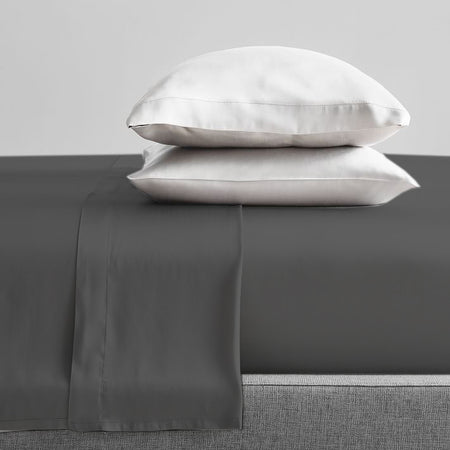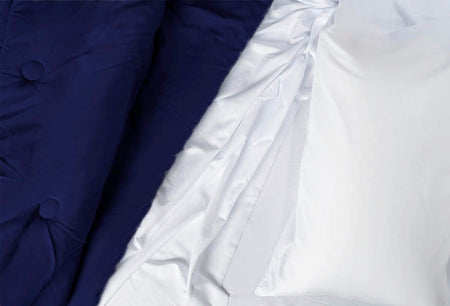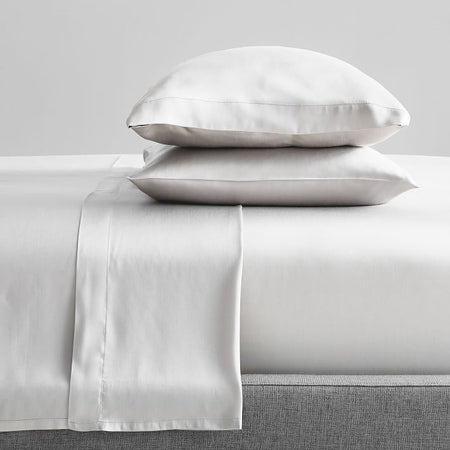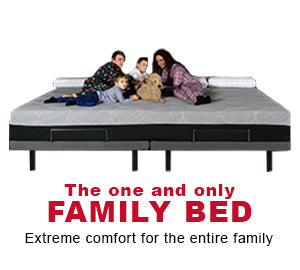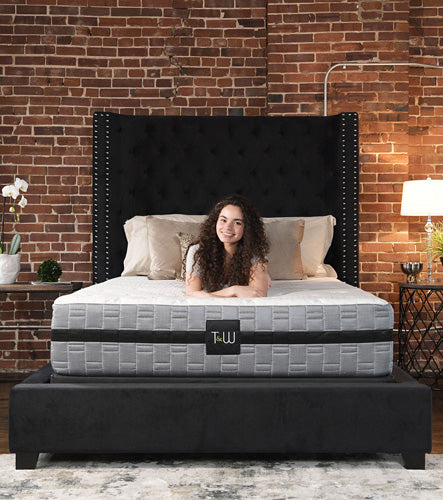The Hidden Role of Your Bed in Managing Seasonal Affective Disorder (SAD)
If you’ve ever noticed your mood and sleep changing as winter sets in, there’s a reason for it. Seasonal Affective Disorder and sleep are closely linked. When one is off balance, the other usually follows. So, how do seasonal rhythms influence mental health and vice versa? Light controls your body clock Your body runs on an internal timer called the circadian rhythm. It relies on sunlight to know when to wake up and when to wind down. During the winter months, the lack of natural light disrupts that rhythm. During periods of shorter daylight, your brain starts making melatonin (the hormone that makes you sleepy) earlier in the day, while producing less serotonin (the chemical that keeps you feeling balanced and motivated). That shift explains why you might feel groggy, low, or sluggish when daylight fades early. Poor Sleep and SAD Feed Off of Each Other When your sleep quality...
-
Nov 25, 2025
Sleeping with the TV On: Healthy Habit or Sleep Sabotage?
It’s a familiar scene. You’re lying in bed, exhausted but restless. So, you flick on the TV, open YouTube, or let a podcast run to quiet the racing thoughts or fill the silence. Before you know it, you’ve drifted off while a late-night talk show host or your favorite television series hums in the background. For many people, sleeping with the TV on feels like the only way to get a good night’s rest. But is it really helping? Or is it quietly sabotaging your sleep quality and long-term health? Let’s explore what the science says about TV shows, background noise, and sleep, along with healthier alternatives that can help your mind and body truly recharge. Is It a Good Idea to Sleep with the TV On? There’s been a lot of research into how the technology we use every day affects our sleep, stress levels, weight, and even our...
-
Oct 30, 2025
Why Your Dreams Have Been So Weird Lately
You go to bed expecting a peaceful night, but wake up feeling shaken, replaying bizarre imagery, unusual scenes, maybe nightmares. Why do dreams sometimes get unusually vivid, strange, or unsettling? And when does it become more than just a “weird night”? Below, we’ll unpack the science behind weird dreams, the various culprits, and concrete ways to calm things down, so you can return to more restful nights. What’s Going On in Your Brain When Dreams Get Weird? To understand why your dreams sometimes feel unusually vivid, strange, or even unsettling, it helps to look at what’s happening in the brain while you sleep. Sleep isn’t one long, steady state. Instead, your body cycles through different stages several times each night. In the early stages of non-REM (NREM) sleep, your body relaxes and brain activity slows down. Stages one and two are considered light sleep, while stage three is known as...
-
Oct 22, 2025
Do Expensive Sheets Really Help You Sleep Better?
You’ve probably seen them, glossy magazine spreads or celebrity home tours where someone casually mentions they “only sleep on $2,000 Egyptian cotton sheets.” It makes you wonder: Are my regular bed sheets ruining my chance at a good night’s sleep? Here’s the truth: studies show that high-quality bedding is linked with better sleep. The right sheets, blankets, and pillows can help regulate body temperature, reduce tossing and turning, and keep you comfortable through the night. That means you’re more likely to reach restorative stages of sleep, the ones that help your body repair, reset, and recharge. But before you run out to splurge on luxury bed linens, let’s look closer. Because while bedding accessories matter, the biggest factor in long-term sleep quality will always be your mattress. Why Bedding Matters for Sleep Your bedding is the closest layer between you and your mattress, and it sets the tone for comfort....
-
Sep 09, 2025
Mattresses in Space: What Do Astronauts Sleep On Up There?
In a recent article, we explored how a NASA invention for astronauts turned into memory foam mattresses that improve our sleep every night (see From NASA to Your Bedroom: The Evolution of Memory Foam Mattresses). But what about the astronauts themselves? Up on the International Space Station (ISS), crew members aren’t dozing on king-size beds; they’re cocooned in sleeping bags attached to the wall as they hurtle around Earth at 17,500 mph. In fact, an astronaut on the ISS experiences 16 sunrises and sunsets every 24 hours, making a “normal” night’s sleep a bit of a cosmic challenge. It sounds wild, yet many astronauts insist that sleeping in space can be extremely comfortable – perhaps even more comfortable than on Earth – once you get used to it. How Astronauts Go to Bed Astronauts don’t use traditional mattresses in space. Instead, each crew member sleeps solo in a small, closet-like...
-
Aug 11, 2025
Jet Lag Recovery: Can Your Mattress Help You Adjust Faster?
Jet lag is essentially a circadian rhythm sleep disorder. Normally, your body clock is tuned to the 24-hour day–night cycle: daylight keeps you awake, and darkness tells your brain it’s time for sleep. But when you zoom across several time zones in a matter of hours, your internal clock can’t instantly catch up. For example, if you fly from New York to London and arrive at 11 PM local time, your body might still feel like its 6 PM back in New York, making it hard to fall asleep. Your body then goes through a “recouping” phase – sometimes linked to the growing pains of adjusting to a new schedule. The adjustment takes time. In practice, your circadian clock shifts by roughly 1–1.5 hours per day as you reset to the new zone. This means if you cross, say, 6 time zones, it could take around 4–6 days to adapt...
-
Jul 16, 2025
Napping Like a Pro: How Power Naps Enhance Productivity and Health
You know that moment, when your brain checks out, your eyelids get heavy, and everything just feels… slower? It usually hits right after lunch, and no, it’s not just you. Turns out, your body’s wired for a midday dip in energy. And the fix isn’t always another cup of coffee. Sometimes, what you really need is a quick nap. That’s why companies like Google and Ben & Jerry’s have built nap rooms into their offices. They know what NASA discovered: a short nap can boost alertness by 54% and improve performance by 34%. Why Power Naps Work The magic of power naps lie in their timing. When you rest for a short period, usually between 10 and 20 minutes, your brain stays in the lighter stages of sleep. Your body relaxes, your mind clears, and stress levels drop. This short burst of rest helps improve focus, lift your mood, and...
-
Jul 07, 2025
How Temperature-Sensitive Mattresses Improve Sleep for Hot Sleepers
If you often wake up drenched in sweat or feel hot at night, your body may be trying to tell you something: it’s too hot to sleep. Sleeping hot is a common problem. According to a joint study by Gallup, a majority of US adults (57%) report being too hot while sleeping at least occasionally, compared to only 37% who report being too cold. For hot sleepers, this constant battle against body heat disrupts sleep quality. That’s where temperature control mattresses come in. Designed with innovative materials such as cooling gel, breathable memory foam, and moisture-wicking covers, these mattresses aim to reduce nighttime heat and create an ideal sleeping climate. Let’s explore why overheating affects sleep, how new mattress technologies are helping, and why your current setup—including your bed frame, mattress, and accessories—might be working against your health and comfort. The Real Impact of Overheating at Night The human body...
-
Jun 30, 2025


